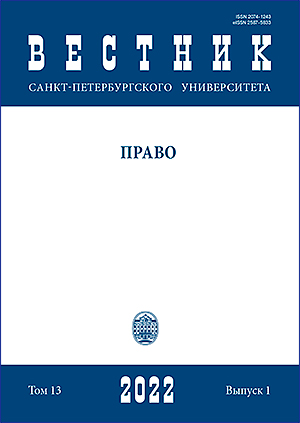Regulation of the use of big data in the Republic of Korea and Russia
DOI:
https://doi.org/10.21638/spbu14.2022.114Abstract
Modern innovations driven by big data processing technologies are increasingly in conflict with international principles for protecting personal information and call into question the effectiveness and adequacy of existing legal mechanisms for protecting confidentiality of personal information. The relevance of the problem under study is due to the insufficient development of theoretical and methodological aspects of legal regulation of big data in the Russian Federation and the need to implement positive foreign experiences for building a mechanism for legal regulation of this institution. The purpose of the essay is to study the positive experience of legal regulation of the use of big data in the Republic of Korea for its implementation in Russian legislation. The leading method for studying this problem is a comparative legal one, which allows the authors to formulate proposals for improving domestic legislation. The study led to the following conclusion. The main area for improvement the legal regulation of the processes of using big data are: the right of users to access their data and check the activities of companies with them, the right to stop using and further delete data, the right to change data, the right to data portability. The study revealed that the Korean experience shows the need to expand the processing and use of personal data, which in turn contributes to the wider use of big data. The study will allow, based on foreign experience, to create an effective Russian system of legal regulation of big data. The novelty and originality of the study lies in the fact that it was the first to study the experience of the legislator of the Republic of Korea in this area.
Keywords:
foreign experience, legal regulation, big data, implementation, personal data, automated processing
Downloads
References
Downloads
Published
How to Cite
Issue
Section
License
Articles of "Vestnik of Saint Petersburg University. Law" are open access distributed under the terms of the License Agreement with Saint Petersburg State University, which permits to the authors unrestricted distribution and self-archiving free of charge.






